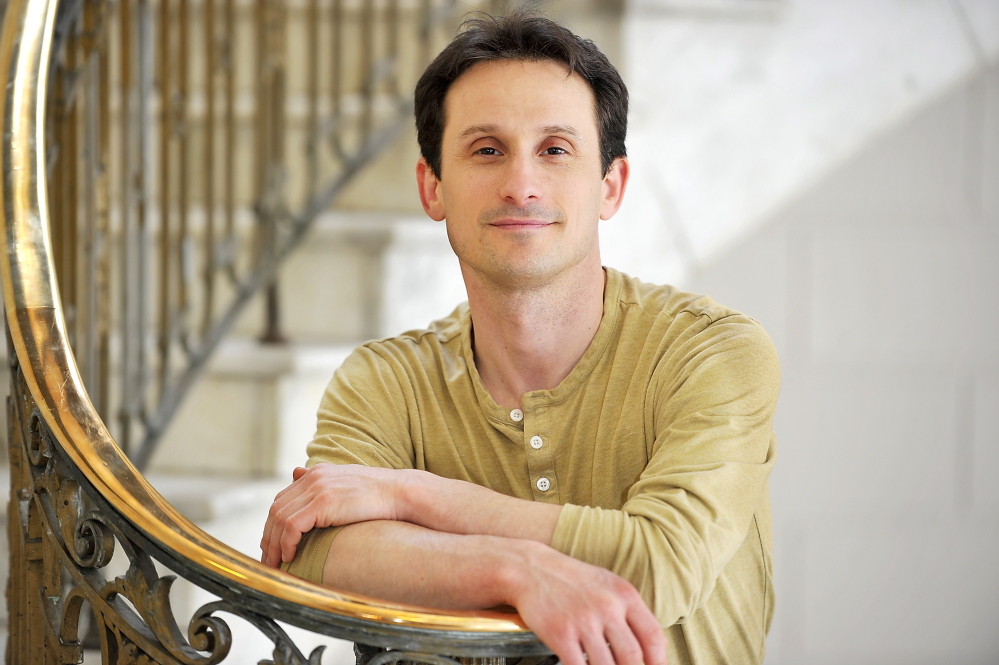In Portland, it’s everything from goat mowing to more community gardens and a public orchard, as city dwellers sink their teeth into projects for the Mayor’s Initiative for a Healthy and Sustainable Food System.
More local foods on patients’ and students’ plates. A public orchard where any passerby can pick and eat apples, pears or peaches. A big urban farm that could supply food to Portland’s schools, hospitals and other institutions. And goat mowing.
Yes, goat mowing.
Those are some of the more visible projects being worked on by a wide-ranging group of Portlanders who have joined the Mayor’s Initiative for a Healthy and Sustainable Food System. Mayor Michael Brennan formed the initiative in 2012 after participants in a casual community food forum expressed a desire for a council that could work on the city’s food policy and on increasing residents’ access to local foods.
Portland is not alone. Nationally, cities from Burlington, Vermont, to Baltimore are sponsoring food policy initiatives, whether it be through the U.S. Conference of Mayors Food Policy Task Force or the more informal food policy council movement.
In Portland, six subcommittees meet regularly to work on diverse projects that meet the initiative’s lofty goals: to produce as much food as possible in the city, to make healthier food “the easier choice” for residents, and to create economic opportunity and inspire “greater human possibility.”
That’s a lot for anyone’s plate. But it does express the surprising amount of passion Brennan says he has witnessed in the group of well over 100 volunteers who have worked on the project so far.
“One of the things that has struck me over the past three or four years about this whole issue is how for people under 40 – I just turned 62 – they have a passion about food that shapes their politics in ways that I never quite understood before,” Brennan said. “There are people involved in this project that can tell you everything about Monsanto, about agribusiness, about how food is produced or not produced, and the cost and the politics of it, but they’re not Democrats, Republicans, Greens or Independents in terms of their political orientation. It’s just been interesting to me that their politics are driven by their perception of food.”
Next month, these passionate Portlanders will hold a community forum to discuss and get feedback on their ideas. Some of their plans, such as sourcing more local produce and seafood for the city’s schools, hospitals and other institutions, are complex so probably won’t come to fruition quickly. But smaller projects are already noticeable to Portland residents – or will be soon.
Although the city is providing land for some of the projects, as well as staff time and resources, much of the mayor’s initiative involves simply bringing people together in public-private partnerships. Also involved are nonprofit groups and foundations that can search out grants to help pay for the work. Those working on the initiative believe that some of the projects will reap dividends in the long run by building on Portland’s food infrastructure and food economy, and making the city a more attractive place to live.
Here’s a glimpse at a few of the projects under discussion and under way:
HELP WANTED: GOAT HERDER
The goat project isn’t directly related to food, but it fits in with the initiative’s environmental ethos, and while using goats to keep a landscape trimmed and weed-free may sound a little crazy, it’s not unprecedented:
Earlier this month, the Portland on the other coast established a herd of 40 goats (and a llama to scare away coyotes) to clear the city’s airport of weeds and invasive plants. Chicago O’Hare International Airport has been using goats since 2013, and Boston has also had some success. The ungulates have even become attractions, according to Troy Moon, environmental programs manager for the city of Portland. “In Boston and other communities where people use the goats,” he said, “people want to go see them.”
Will the goats save Portland money on mowing? It’s too early to know, Moon said. He added that the project would probably start small, with three or four goats. First, though, the city needs a willing, entrepreneurial goat herder “because we’re not in the goat-herding business,” Moon said. If the city can find that person, a pilot project could be up and running as soon as this summer.
INITIATIVE BEARS FRUIT
Another highly visible project is the Mt. Joy Orchard, a public orchard located on a slope of land the city owns behind the East End Community School. Last year, the city planted about 40 apple trees there, along with some pear and peach trees. The trees were funded by the city, public contributions and John Bunker, head of Fedco seeds in Waterville. The Resilience Hub, a nonprofit Portland-based group that promotes permaculture, will provide the labor to maintain and develop the orchard. Volunteers intend to write a master plan to guide food and medicinal plant production, removal of invasives (maybe those goats can help?), and more.
The orchard is just one of several garden projects that the mayor’s food initiative supports:
n In East Bayside, berry bushes, fruits, nuts are planned as part of a new project called “Fox Field Food Forest,” created by the East Bayside Neighborhood Association.
n On Munjoy Hill, the city is creating a new community garden with the help of a $15,000 grant. The garden has grown out of the city’s work with Cultivating Community – a Portland-based nonprofit that promotes better access to healthy, local foods – to expand the city’s community gardens. A goal of the mayor’s food initiative is that anyone who wants a community garden plot should be able to get one, but for now, 167 people are on a waiting list. The new garden will be on the Eastern Promenade behind the tennis courts. With some 50 plots, the Munjoy Hill garden is expected to take a large bite out of that waiting list.
n On a larger scale, the mayor’s initiative is exploring the idea of an urban farm within the city limits that could provide jobs to the community and food to Portland’s restaurants, schools and other institutions. “There are urban farms that are sprouting up all over the country,” says Jonah Fertig, a co-founder of Local Sprouts Cooperative who has been active on the subcommittees exploring urban agriculture and farm-to-institution opportunities. “A lot of them are definitely being started by younger people who are interested in connecting with the land and the food system, but also want to live in the city.”
Although the city has scouted a few locations, the farm is still a long way from reality – it needs money, land, an ownership structure and people who are enthusiastic about pushing the idea forward.
REVISING REGS?
Some of the ideas under consideration probably can’t move forward without regulatory change, so the initiative is taking a look at city ordinances. For instance, the city has no beekeeping ordinance (usually designed in part, to prevent conflicts between bees and humans), but 29 beekeepers living within Portland city limits have registered 170 hives with the state, according to Tony Jadczak, the state apiarist and bee inspector.
Also, a handful of Portland residents have expressed interest in raising small livestock such as goats, sheep and pigs within city limits, and these animals aren’t covered by the city’s existing chicken ordinance.
The person researching these ordinances is a new policy intern in the city’s urban planning department, who was hired with a grant from a network of community food councils. In addition to looking into the ordinance issues, she’s been charged with conducting a “food policy audit” to get a sense of Portland’s policies around, for example, food procurement. The intern will be looking for ways the city can close any policy gaps and improve its handling of food programs, according to Ben Tettlebaum of the Conservation Law Foundation, who serves as chair of the policy subcommittee.
Policy changes could help get more local food into the city’s schools, nursing homes, hospitals and even the county jail, a task that is critical to the mayor’s initiative, Tettlebaum said. Right now, as much as 90 percent of the food we eat in Maine is imported into the state, he said, which represents a lot of dollars that don’t end up in Mainers’ pockets.
“If Portland can capitalize on this local food idea, it can have a huge effect on the state,” he said. “That can impact farmers all the way up to Aroostook.”
SCHOOL LUNCH
Ron Adams, director of food services at Portland Public Schools, has a good example of just how that works: When he started his job seven years ago, the school district was importing apple wedges from Washington state. Now Adams buys whole Maine apples, and the $40,000 he used to spend goes to Maine farmers.
But Adams has more work to do to meet Mayor Brennan’s goal that by 2016 half the food eaten in Portland schools be homegrown. At the moment, Adams said, the district is “pushing 35 percent.” To reach the 50 percent goal without spending more taxpayer dollars, more kids need to buy school lunch, Adams said, explaining that since labor and other costs are fixed, the more meals the district serves, the less each costs. He’s trying to figure out a way to make school lunch “cool” to encourage more takers – perhaps playing up the local foods angle?
Adams says he buys into the mayor’s vision that if the city invests in its kids, that will attract more young families to Portland and help build the economy.
“Food is the calling card to build the city,” he said.
Serving more local seafood is also on Adams’ priority list, which makes him right on trend, as getting more local seafood into the hands of institutional buyers is a hot topic of discussion these days at meetings of the mayor’s food initiative. Brennan said 30 people gathered earlier this month at the Gulf of Maine Research Institute to talk about the subject, buyers and processors sitting down together to work through issues such as portion control and consistent availability.
Geoffrey Smith, director of The Nature Conservancy’s Gulf of Maine Marine Program, is “confident that this initiative will benefit our schools and hospitals while providing a real economic boost for our fishermen and farmers.”
“We are deeply concerned about the current situation with codfish,” Smith said, “but we have healthy stocks of haddock, pollock and redfish right here in the Gulf of Maine, and those are the species we want to try to improve the market for here locally.”
Brennan likes “the multiplier effect” of all the projects that fall under the food initiative’s big umbrella. It’s one reason he thinks the initiative is here to stay. It’s not just about local food; it’s about making healthier choices. And it’s not just about food; it’s about helping the city achieve economic and environmental goals.
Meredith Goad can be contacted at 791-6332 or at:
Twitter: MeredithGoad
Send questions/comments to the editors.





Success. Please wait for the page to reload. If the page does not reload within 5 seconds, please refresh the page.
Enter your email and password to access comments.
Hi, to comment on stories you must . This profile is in addition to your subscription and website login.
Already have a commenting profile? .
Invalid username/password.
Please check your email to confirm and complete your registration.
Only subscribers are eligible to post comments. Please subscribe or login first for digital access. Here’s why.
Use the form below to reset your password. When you've submitted your account email, we will send an email with a reset code.